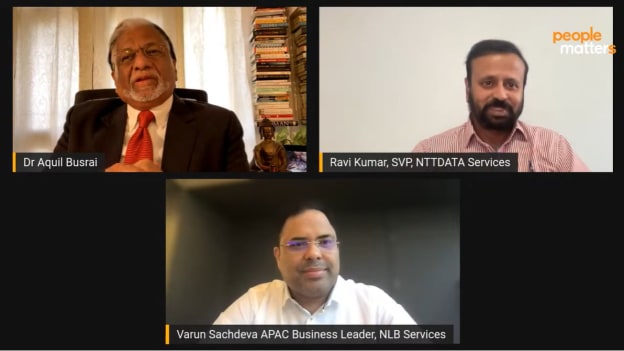Investing in the talent pipeline: What are the solutions your business needs?

Technology has become a critical enabler in all HR functions but it exerts its greatest influence in the arena of talent management. However, before deploying any digital solutions, organisations must take account of the business context they face, one that continues to change rapidly in unprecedented ways.
In an exciting session hosted by People Matters in partnership with NLB Services and moderated by Dr Aquil Busrai, CEO, of Aquil Busrai Consulting, questions surrounding the ongoing talent gap, and the role of the gig economy and the ever-rising talent demand were discussed and deliberated upon. We were also joined by leaders Ravi Kumar, Senior Vice President - Projects & Application Services, NTT DATA Services and Varun Sachdeva, APAC Recruitment & Business Leader, NLB Services.
‘Talent management comprises three buckets: acquisition, engagement and retention. What we are witnessing is a change in the talent approach, socio-economic conditions as organisations have become flatter and more informal styles of management are coming in,’ said Dr Busrai as he opened the session.
The evolving context of recruitment:
In discussing the IT industry, Ravi Kumar raises the issue of a rising talent demand. Although NASSCOM reported a 21% demand-supply gap when it comes to IT Talent, he believes it to be 30-32%. When faced with such circumstances, talent methods need to adapt to the changing times. This is where the implementation of technology comes in and the use of data to supplement in times of strategic decision making when advancing business growth.
Varun Sachdeva also highlights how speed and quality have become two important components of the current recruitment ecosystem. Building a talent pipeline requires a lot of backend work dedicated to upskilling your people for more efficient teamwork and greater productivity. He further highlights how India will become the global hub for tech talents driven by the three principles of skill, society and sustainability. Inevitably, upskilling and reskilling of tech talent will become fundamental for the future growth of organisations.
Defining the current workforce:
As the role of the gig economy becomes more important, organisations will have to balance between flexible and permanent employment roles. Given that the younger generation wishes for more choices when it comes to when and where they work, an interesting strategy would be to hire people for work and not for hours. This could also result in more accurate performance management.
But when hiring people part-time, the question of culture comes into play. Are we making employment too transactional? Where does culture lie? Where does growth come in? An answer for the time being lies in how learning will be fundamental for every individual to keep pace with the evolving business context. Simultaneously, organisations will also invest in a learning culture to ensure that their workforce can meet both immediate and future organisational needs.
Digital transformation leads the way:
Business models today must be flexible, scalable and agile to overcome the ongoing talent gap. An interesting solution that has come into play is partnering with organisations that will deploy relevant and practical training to ensure that the workforce you hire is readily employable. While industry-academia collaboration is a must to build a solid talent community, such partnerships tend to relieve the financial burden on corporates when it comes to investing in structured training of new hires. Time is also saved and the productivity of your recruit can be heightened at the very beginning of their career.
Disruption is a key component of today’s environment of people and work. Most of it can be attributed to digital transformation in light of the pandemic. The plus side of this is the increase in opportunities to innovate and to find solutions even during turbulent times.
Today’s talent pipeline demands the active particpipelineipation of businesses to enable and empower a community of learners. Investing in the talent you bring in early on and in the workforce you currently have will result in productivity with innovation, with creativity. If you want to bridge the talent gap you currently face, technology will be an important facet but this has to be aligned to your business needs to achieve the growth you envision.












